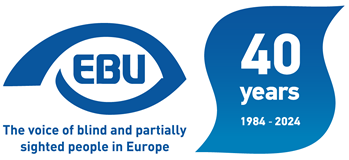Accessible lifts
EBU asked and obtained to participate in the CEN/CLC/JTC 11 on a European Standard (EN) on functional European accessibility requirements in the built environment (prEN 17210), in Madrid on 26-28 November. The aim was to avoid that the faulty Accessibility to Lifts standard (EN 81-70: 2018) reappear through this more general standard as far as lifts are concerned; also to recall the importance of Braille.
The results of this meeting were quite good. It was agreed that the following would become requirements:
- Provision of Braille (which is just a recommendation in the Accessibility to Lifts standard)
- Touchscreens
- Hearing enhancement system
- Alarm system
- Audible information
Some other functional accessibility to lift issues will remain mere recommendations, but in any case it will be pointed out in the prEN 17210 when it is more demanding than the current EN 81-70 edition.
Besides, JTC 11 will inform CEN/TC 10 on the main functional accessibility requirements on lifts that should be included in the next revision of EN 81-70.
MISCELLANEOUS
- On 28-29 November we attended the European Day of Persons with Disabilities conference in Brussels. This year the conference revolved around the evaluation of the currently ending 5-year European Disability Strategy, and the DPOs expectations for the next Strategy – yet to be confirmed. Our President was a speaker in the panel on dialogue with NGOs. Embarked in the EBU delegation for this event were representatives of our Slovenian and Spanish members.
- The 10th edition of the Accessible City Award took place after the conference, with Warsaw given the main prize this year. We were consulted by the Commission on the audio-description of the Award anniversary video, and Tanja Kleut, of the EBU Access Podcast, provided much appreciated advice.
- On 11 December we organised a cocktail event at the European Parliament, kindly sponsored by French MEP Chrysoula Zacharopoulou (Renew Europe Group), for our national member organisations to meet with MEPs and exchange around our Statement on European Elections 2019. The cocktail was attended by MEPs from 12 EU countries and from a variety of political groups and committees, with a good share of newly elected MEPs and MEPs not having yet expressed or confirmed interest for the Disability Intergroup. Besides the sponsor MEP and our President, a representative of the Commission’s unit for Disability and the EDF president delivered introductory speeches. This event was a first contact to put EBU on the scene with the new MEPs and give an overview of our asks to the new legislature.
- On 17 December, in the European Parliament plenary, Commissioner for Equality Helena Dalli introduced a debate on the future European Disability Strategy, recalling that there are about 100 million persons with disabilities in the EU, and that they must not be left behind. She said that it was “essential to this Commission” to address their rights and that it was fully committed to implementing the UNCRPD; that the Disability Strategy is the main instrument for that and that having a new strategy for the next 10 years is “certainly an option”; that however a decision on that will not take place before the end of the ongoing evaluation of the 2010-2020 Strategy, “by mid-2020”. Ms Dalli’s speech was followed by interventions of some 40 MEPs, expressing a consensus about the need for an ambitious and well-resourced strategy.
- Good news: the European Parliament's Disability Intergroup was formally re-established and the list of members (currently 60) is available. Our lobbying alongside EDF surely contributed to this result.

